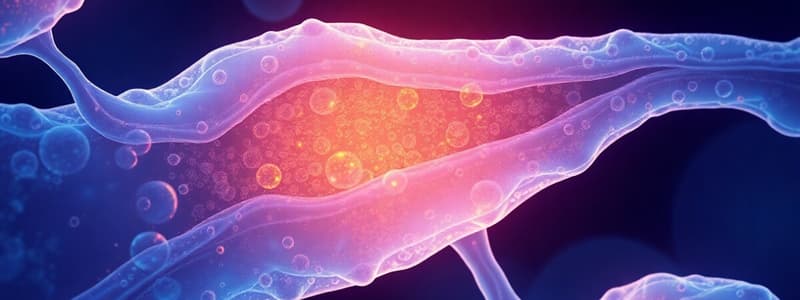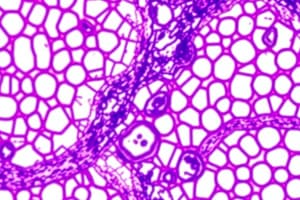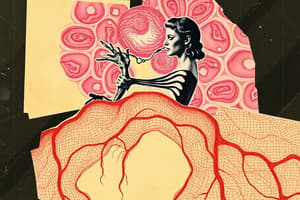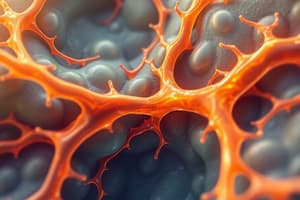Podcast
Questions and Answers
What type of cartilage is primarily found at the growth plates in long bones?
What type of cartilage is primarily found at the growth plates in long bones?
- Hyaline cartilage (correct)
- Fibrocartilage
- Dense regular cartilage
- Elastic cartilage
Which type of adipose tissue primarily serves as an energy reserve?
Which type of adipose tissue primarily serves as an energy reserve?
- Reticular adipose tissue
- Multilocular adipose tissue
- Septal adipose tissue
- Unilocular adipose tissue (correct)
What distinguishes cardiac muscle cells from skeletal muscle cells?
What distinguishes cardiac muscle cells from skeletal muscle cells?
- Skeletal muscle cells are branched.
- Cardiac muscle cells contain multiple nuclei.
- Cardiac muscle cells have intercalated discs. (correct)
- Skeletal muscle cells do not have striations.
Which cell type is responsible for secreting osteoid to form bone?
Which cell type is responsible for secreting osteoid to form bone?
What type of muscle can undergo hyperplasia in response to increased demand?
What type of muscle can undergo hyperplasia in response to increased demand?
What is the main function of lymph nodes in the immune system?
What is the main function of lymph nodes in the immune system?
What characterizes multilocular adipose tissue?
What characterizes multilocular adipose tissue?
What type of cartilage is typically found in intervertebral discs?
What type of cartilage is typically found in intervertebral discs?
Which component of skeletal muscle surrounds individual muscle fibers?
Which component of skeletal muscle surrounds individual muscle fibers?
Natural killer cells are primarily involved in which type of immune response?
Natural killer cells are primarily involved in which type of immune response?
What is the primary material that composes osteoid?
What is the primary material that composes osteoid?
Which type of collagen is found in hyaline cartilage?
Which type of collagen is found in hyaline cartilage?
What forms the central network of cardiac muscle cells?
What forms the central network of cardiac muscle cells?
What is a characteristic of simple tissue?
What is a characteristic of simple tissue?
Which type of junctions in epithelial cells allows direct communication between cells?
Which type of junctions in epithelial cells allows direct communication between cells?
What function do microvilli primarily enhance in epithelial cells?
What function do microvilli primarily enhance in epithelial cells?
What is the main component of the basement membrane?
What is the main component of the basement membrane?
Which of the following statements accurately describes compound tissue?
Which of the following statements accurately describes compound tissue?
Which surface adaptation is specifically designed to move substances over the cell surface?
Which surface adaptation is specifically designed to move substances over the cell surface?
What role do anchoring junctions play in epithelial layers?
What role do anchoring junctions play in epithelial layers?
What is the primary benefit of basolateral folds on epithelial cells?
What is the primary benefit of basolateral folds on epithelial cells?
What is the primary function of cilia on epithelial cells?
What is the primary function of cilia on epithelial cells?
Which type of epithelium is characterized by layers where only the basal layer contacts the extracellular matrix?
Which type of epithelium is characterized by layers where only the basal layer contacts the extracellular matrix?
Which type of epithelial cell is specialized for secretion and absorption and may have microvilli or cilia on its free surface?
Which type of epithelial cell is specialized for secretion and absorption and may have microvilli or cilia on its free surface?
What is the primary role of fibroblasts in connective tissue?
What is the primary role of fibroblasts in connective tissue?
What is a defining characteristic of transitional epithelium?
What is a defining characteristic of transitional epithelium?
What does the suffix 'blast' signify in cell nomenclature?
What does the suffix 'blast' signify in cell nomenclature?
Which protein is acknowledged for forming stretchable and resilient fibers in connective tissue?
Which protein is acknowledged for forming stretchable and resilient fibers in connective tissue?
What type of secretion involves the shedding of the entire cell?
What type of secretion involves the shedding of the entire cell?
What defines simple squamous epithelium's structure?
What defines simple squamous epithelium's structure?
What do reticular fibers primarily consist of?
What do reticular fibers primarily consist of?
What is the structure that anchors and supports epithelium to the underlying connective tissue?
What is the structure that anchors and supports epithelium to the underlying connective tissue?
Which type of cell is responsible for producing adipose tissue?
Which type of cell is responsible for producing adipose tissue?
What type of epithelium consists of crowded columnar cells that may appear layered?
What type of epithelium consists of crowded columnar cells that may appear layered?
Which layer of the basement membrane is closest to the epithelium?
Which layer of the basement membrane is closest to the epithelium?
What primarily comprises the lymphoid follicles in the superficial cortex?
What primarily comprises the lymphoid follicles in the superficial cortex?
What characterizes secondary follicles compared to primary follicles?
What characterizes secondary follicles compared to primary follicles?
What is the principal function of the spleen?
What is the principal function of the spleen?
Which type of lymphoid tissue is located beneath the mucosa of the bronchi?
Which type of lymphoid tissue is located beneath the mucosa of the bronchi?
Which layer of the heart wall is composed of cardiac muscle cells?
Which layer of the heart wall is composed of cardiac muscle cells?
What is the role of Purkinje fibres in the heart?
What is the role of Purkinje fibres in the heart?
What structure immediately provides support to the endocardium?
What structure immediately provides support to the endocardium?
What type of blood vessels are characterized by carrying blood away from the heart?
What type of blood vessels are characterized by carrying blood away from the heart?
Which of the following statements regarding large elastic arteries is correct?
Which of the following statements regarding large elastic arteries is correct?
What layer of blood vessels provides the most structural support?
What layer of blood vessels provides the most structural support?
What do capillaries primarily facilitate?
What do capillaries primarily facilitate?
Which blood vessel type is characterized as having less muscle compared to arteries?
Which blood vessel type is characterized as having less muscle compared to arteries?
What is the smallest type of venule called?
What is the smallest type of venule called?
What is the composition of arterioles?
What is the composition of arterioles?
Flashcards
What is a cell?
What is a cell?
The basic unit of structure of most living organisms.
What is a Tissue?
What is a Tissue?
A discrete, organized collection of cells having similar morphological characteristics and functions.
What is a simple tissue?
What is a simple tissue?
Cells forming a tissue are all of the same structure.
What is a compound tissue?
What is a compound tissue?
Signup and view all the flashcards
What is an Organ?
What is an Organ?
Signup and view all the flashcards
What is a System?
What is a System?
Signup and view all the flashcards
What are epithelial cells?
What are epithelial cells?
Signup and view all the flashcards
What are epithelial cell junctions?
What are epithelial cell junctions?
Signup and view all the flashcards
Cilia
Cilia
Signup and view all the flashcards
Keratinization
Keratinization
Signup and view all the flashcards
Simple epithelium
Simple epithelium
Signup and view all the flashcards
Pseudostratified columnar epithelium
Pseudostratified columnar epithelium
Signup and view all the flashcards
Endothelium
Endothelium
Signup and view all the flashcards
Mesothelium
Mesothelium
Signup and view all the flashcards
Simple columnar epithelium
Simple columnar epithelium
Signup and view all the flashcards
Stratified epithelium
Stratified epithelium
Signup and view all the flashcards
Transitional epithelium (urothelium)
Transitional epithelium (urothelium)
Signup and view all the flashcards
Secretory epithelium
Secretory epithelium
Signup and view all the flashcards
Merocrine secretion
Merocrine secretion
Signup and view all the flashcards
Apocrine secretion
Apocrine secretion
Signup and view all the flashcards
Holocrine secretion
Holocrine secretion
Signup and view all the flashcards
Parenchymal cells
Parenchymal cells
Signup and view all the flashcards
Support cells
Support cells
Signup and view all the flashcards
Lymphoid follicles
Lymphoid follicles
Signup and view all the flashcards
Germinal center
Germinal center
Signup and view all the flashcards
Paracortex
Paracortex
Signup and view all the flashcards
Plasma cell
Plasma cell
Signup and view all the flashcards
White pulp
White pulp
Signup and view all the flashcards
Red pulp
Red pulp
Signup and view all the flashcards
Mucosa-associated Lymphoid Tissue (MALT)
Mucosa-associated Lymphoid Tissue (MALT)
Signup and view all the flashcards
Gut-associated Lymphoid Tissue (GALT)
Gut-associated Lymphoid Tissue (GALT)
Signup and view all the flashcards
Bronchus-associated Lymphoid Tissue (BALT)
Bronchus-associated Lymphoid Tissue (BALT)
Signup and view all the flashcards
Nasal-associated Lymphoid Tissue (NALT)
Nasal-associated Lymphoid Tissue (NALT)
Signup and view all the flashcards
Skin-associated Lymphoid Tissue (SALT)
Skin-associated Lymphoid Tissue (SALT)
Signup and view all the flashcards
Epicardium
Epicardium
Signup and view all the flashcards
Myocardium
Myocardium
Signup and view all the flashcards
Endocardium
Endocardium
Signup and view all the flashcards
What is hyaline cartilage?
What is hyaline cartilage?
Signup and view all the flashcards
What is fibrocartilage?
What is fibrocartilage?
Signup and view all the flashcards
What is elastic cartilage?
What is elastic cartilage?
Signup and view all the flashcards
What are osteoblasts?
What are osteoblasts?
Signup and view all the flashcards
What are osteocytes?
What are osteocytes?
Signup and view all the flashcards
What is unilocular adipose tissue?
What is unilocular adipose tissue?
Signup and view all the flashcards
What is multilocular adipose tissue?
What is multilocular adipose tissue?
Signup and view all the flashcards
What are muscle cells?
What are muscle cells?
Signup and view all the flashcards
What are myofibroblasts?
What are myofibroblasts?
Signup and view all the flashcards
What are pericytes?
What are pericytes?
Signup and view all the flashcards
What are myoepithelial cells?
What are myoepithelial cells?
Signup and view all the flashcards
What are the sarcolemma, sarcoplasm, and sarcoplasmic reticulum?
What are the sarcolemma, sarcoplasm, and sarcoplasmic reticulum?
Signup and view all the flashcards
How do actin and myosin contribute to muscle contraction?
How do actin and myosin contribute to muscle contraction?
Signup and view all the flashcards
How are skeletal muscle fibers organized?
How are skeletal muscle fibers organized?
Signup and view all the flashcards
Study Notes
Epithelial Tissues
-
Epithelial cells form sheets (epithelia) covering body surfaces, both internal and external.
-
Functions include secretion, absorption, and protection.
-
Cell junctions (occluding, anchoring, communication junctions) bind cells together and maintain integrity, linking cytoskeleton and ensuring communication between cells.
-
The basement membrane, a layer of extracellular matrix, anchors the epithelial layer to underlying tissues. It's composed of type IV collagen and laminin.
-
Surface adaptations (microvilli, stereocilia, basolateral folds, cilia, keratin) increase surface area, move substances, and provide protection
-
Microvilli: Finger-like projections enhancing absorption in kidney tubules and intestines.
-
Stereocilia: Extremely long microvilli; found in epididymis.
-
Basolateral folds: Involved in fluid/ion transport; found in renal tubular cells and secretory ducts.
-
Cilia: Motile projections; transport materials over cell surfaces, found in respiratory and female reproductive systems.
-
Keratinization: Condensation of cytoskeleton proteins in outer epithelial layers forms a protective barrier (keratin), found in skin epithelium.
-
Simple epithelium: Single layer of cells contacting the basement membrane.
-
Pseudostratified columnar: Appears layered but all cells reach the basement membrane but not all reach the surface. Found in pharynx, trachea, bronchi, and urethra.
-
Endothelium: Simple squamous epithelium lining the heart, blood vessels, lymphatics.
-
Mesothelium: Simple squamous epithelium lining body cavities.
-
Simple columnar: Tall, column-shaped cells, with or without surface modifications (cilia/microvilli), found in secretion/absorption regions (stomach, intestine, gallbladder, cervix).
-
Stratified epithelium: Multiple layers of cells with only the basal layer contacting the basement membrane.
-
Transitional epithelium/Urothelium: Specialized stratified epithelium found only in urinary tract.
Glands
- Epithelial cells specialize in secreting macromolecules (enzymes, mucin, hormones).
- Modes of secretion:
- Merocrine: Exocytosis from cell apex (salivary, sweat, pancreatic glands)
- Apocrine: Pinching off apical cytoplasm (mammary glands)
- Holocrine: Shedding of entire cell (sebaceous glands)
Connective Tissues
-
Connective tissues support other tissue types.
-
Parenchymal cells: Perform major functions of a tissue (e.g., hepatocytes in the liver).
-
Supporting cells: Provide structural framework.
-
Fibroblasts: Secrete extracellular matrix components (collagen, elastin) in most tissues.
-
Chondrocytes: Secrete cartilage extracellular matrix components.
-
Osteoblasts: Secrete bone extracellular matrix components.
-
Myofibroblasts: Secrete ECM and have a contractile function.
-
Adipocytes: Lipid-storing cells crucial for energy storage, endocrine function, and protection.
Fibrillar Proteins
- Provide tensile strength and support in extracellular matrix.
- Collagen: Most important fibrillar component, synthesized by fibroblasts and other support cells. Forms filaments, fibrils, and meshworks.
- Elastin: Stretchable and resilient sheets/fibers, forming elastic fibers (produced by fibroblasts).
- Fibrillin: Part of elastic fiber structure.
- Fibronectin: Mediator glycoprotein linking cells and ECM components (like collagen).
Basement Membrane
-
Composed of type IV collagen, laminins, perlecan, and nidogens (entactins).
-
Laminated layers from interface of the cell membrane to extracellular matrix: Lamina lucida, Lamina densa, Fibroreticular lamina
Specialized Cell Types
-
Fibroblasts: Active in growth and secretion of extracellular matrix; repair roles.
-
Chondroblasts/chondrocytes: Cartilage formation.
-
Osteoblasts/osteocytes: Bone formation and maintenance.
-
Cartilage types: Hyaline (temporary skeleton, growth plates, joints), Elastic (external ear, auditory tube), Fibrocartilage (intervertebral discs, tendon attachments)
-
Adipose tissue types:
- Unilocular/white fat: Energy storage.
- Multilocular/brown fat: Heat production.
Muscle Cells
-
Muscle cells contract via actin and myosin interaction.
-
Types:
- Skeletal muscle: Striated, voluntary, myofibrils.
- Cardiac muscle: Striated, involuntary, intercalated discs.
- Smooth muscle: Involuntary, spindle-shaped, mitosis possible.
-
Structures for skeletal muscle fibers: Sarcolemma, sarcoplasm, sarcoplasmic reticulum.
-
Muscle fiber organization: Endomysium (surrounding individual muscle fibers), Perimysium (surrounds fascicles), Epimysium (surrounds anatomical muscle).
-
Hypertrophy/Hyperplasia: Skeletal, cardiac, and smooth muscle adaptations to increased demand.
Immune Cells and Tissues
- Immune responses occur in secondary immune organs (lymph nodes, spleen) and MALT (mucosa-associated lymphoid tissue).
- B lymphocytes: Bone marrow origin, lymphoid organs and circulation.
- T lymphocytes: Bone marrow origin, thymus maturation, lymphoid organs and circulation.
- Natural killer (NK) cells: Activated cytotoxic lymphocytes, eliminate infected/cancer cells.
- Specialized macrophages: Alveolar macrophages (lungs), Kupffer cells (liver), microglia (brain), sinusoidal cells (spleen).
- Lymph nodes: Filter lymph, harbor immune cells (B/T cells), and non-specific phagocytic cells.
- Spleen: Mounts immune responses, filters blood.
- MALT subtypes: GALT (gut), BALT (bronchus), NALT (nasal), SALT (skin).
Cardiovascular System
-
Heart wall layers: Epicardium (outer), Myocardium (middle, muscle), Endocardium (inner).
-
Coronary arteries/veins: Supply/drain blood to/from the heart.
-
Endocardium layers: Outer (contacting myocardium – collagen, Purkinje fibers), Middle (thickest, collagen/elastic fibers), Inner (endothelial cells).
-
Purkinje fibers: Specialized cardiac muscle fibers for signal conduction.
-
Blood vessels: Arteries (carry blood away from heart), Veins (carry blood to heart).
-
Blood vessel layers (tunica):
- Tunica intima (endothelium, internal elastic lamina)
- Tunica media (smooth muscle, elastic tissue)
- Tunica adventitia (fibroblasts, collagen)
-
Capillaries: Smallest vessels for gas exchange.
-
Postcapillary venules: Smallest venules resembling capillaries, containing more pericytes.
Studying That Suits You
Use AI to generate personalized quizzes and flashcards to suit your learning preferences.




